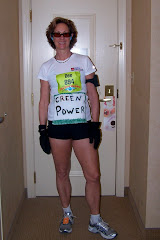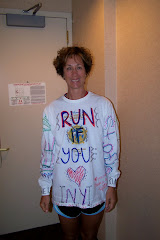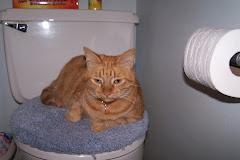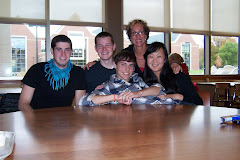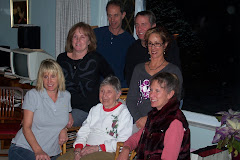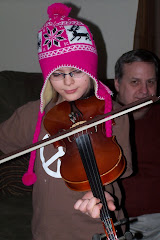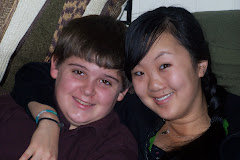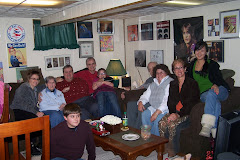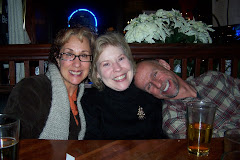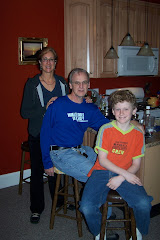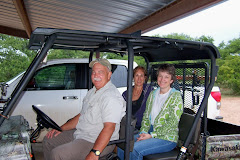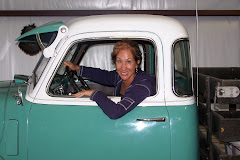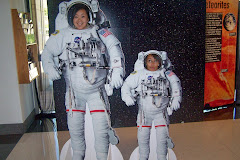Wow—I have a daunting task ahead of me. At the age of 58, I have decided to write the story of my life. I’ve only thought about this for a day or two. Mainly it has come about because of the demise of the financial system in the United States and around the world. At the present time I am personal assistant to a multi-millionaire. He has sold all his hedge funds, most of his stocks, and is taking a wait-and-see attitude. So here I am with not much to do but having to be here every day from 8:00 a.m. to 5:00 p.m. What am I going to do with myself?
Mom wrote her life story about 5 years ago and it was enlightening. I thoroughly enjoyed it and vowed to write my own someday. Of course she was 79 at the time and, like I said, I’m nowhere near that old. But who says I can’t start now, get up to present day and then write the rest as it develops.
I’ve thought a little more about it and I’ve decided this can’t be a “tell-all expose’”. My kids would think it was gross and my husband wouldn’t want to read it. So I will skip the gory details and stick to the main story. That way I won’t have to say, “Some names were changed to protect the innocent.” I guess I’ll just dig right in.
Mom and Dad were high school sweethearts. Mom was actually in the 8th grade when they met and Dad was 3 years older. It was “love at first sight” or so Mom says, and I guess we’ll never know if it’s the truth or not. They were born and brought up in Toledo, Ohio and they were both Catholic. During their married life, they always signed their names: Bets and Greenie, although Mom’s name was Elizabeth Carstensen and Dad’s was Carl Welch. Dad was poor—he slept in the same bed as his grandmother when he was young. His Mother and Father married young and his Father periodically had trouble with alcohol and with holding down a job. His Mother worked steadily and frequently was the one keeping the family afloat. We heard the usual “horror stories” from Dad about walking 10 miles with cardboard in his shoes to make a nickel delivering a paper (or was it a penny?). Mom was relatively well-off. Her Dad worked in a financial office and her mom was a stay-at-home-mom. Dad grew up during the depression which was Mom’s excuse for why he was so darn tight—although I suppose frugal and sensible is a better way to put it. In high school Dad worked flipping hamburgers to help pay for his dates with Mom.
When WWII broke out, Dad enlisted like everyone else. Mom was starting college at Mary Manse, an all-girls’ Catholic College that was run by the Ursuline nuns. Mom also went to an all-girls’ Catholic High School called St. Ursula’s Academy. She had wanted to go to the coeducational Central Catholic High School where Dad went but had won a scholarship to the all-girls’ school. She was very upset but no compromise could be reached. At Mary Manse, Mom was an Education major with an English and Music Minor. She played piano brilliantly although she insisted her whole life that she had no talent. She could play her recital piece, “Flight of the Bumblebee”, well into her 80’s.
During the War, Dad had wanted to be a radio operator flying with fighter pilots; but lucky for us, he was colorblind. He ended up going to a secret school in Boca Raton, Florida, to learn how to put radar in planes. He was stationed on many Pacific islands during the War, but I don’t believe he was involved in any direct action. He frequently wrote Mom letters—she saved a 50-page one he wrote one night before he was shipped overseas. It’s a unique insight into his character and their relationship. His “claim to fame” was his proximity to the Enola Gay, the plane that dropped the bomb on Hiroshima. He was stationed on the Island of Tinian from where the plane left on its fateful mission. After the War, and less than a month after Mom graduated from college, Mom and Dad were married.
The wedding was beautiful. Mom has a book of about 10 pictures—all in black and white, of course—where they both look so young and happy. After the ceremony, they lived in a duplex with Dad’s brother and his wife, Uncle Bob and Aunt Grace. They played hearts and hung out together—two young married couples without a care. Mom worked for a short while as a teacher but hated it. Dad got a job with Jeep where he started as a millwright and worked his way up into management. They lost their first baby a few days’ after she was born. They named her Carla Marie, the same name they gave their next child, my older sister. Mom worried needlessly that they might never have another child, but I don’t think it was long before she was pregnant again.
I think it was after I was born on September 20, 1950 that we moved in with Mom’s parents because the duplex wasn’t big enough for the four of us. I was the second girl and they named me Deanne Marie. I was more often than not called Dee Dee although Dad would call me Deanne sometimes—mostly when I had done something wrong. I remember being told that both Carla and I were baptized Marie because neither of our names were saints’ names. Carla was fair like Mom and I was dark like Dad. Imagine being told your whole life that you looked like your father! Both Carla and I had naturally curly hair when it wasn’t really fashionable. But Mom said we got lots of compliments from relative strangers on the street because of our contrasting looks. Dad’s friend, John Szabo, was building a house for us while we were staying with Grandma and Grandpa.
From the time she met Dad, Mom kept scrapbooks filled with pictures and mementoes. The first one was romantically called, “Me and My Guy” and the second was “Me, My Guy and My Baby”. The scrapbooks are the reason why, much of the time, I don’t remember if I remember something or if I just remember the pictures. There are many pictures of Carla as a naked baby—pictures we teased her about mercilessly when we were young. The first picture of me in the scrapbook was taken when I was about 9 months old. I have very little hair but it is all combed to the top of my head in a peak. My ears, which I inherited from my Mom’s side of the family, were huge even then. You can definitely tell it is me.
I don’t remember moving into the new house and I don’t know exactly when it happened. I just know that shortly after we moved in, my younger sister, Terry Grace, was born. There is a picture of her being held by her godparents, Cousin Jerry and Aunt Pat, in front of the new house. The house was at 2230 Portsmouth Avenue, about three miles from Grandma and Grandpa Carstensen’s. It was in a nice neighborhood with lots of kids. When we moved into the house, the attic wasn’t finished yet and there were just two bedrooms downstairs. Carla and I were both in cribs in the back bedroom and Mom, Dad and Terry slept in the front.
I think this is my first memory because I was still sleeping in the downstairs bedroom. One night when my parents were watching TV, I came out of my room and took a right into the living room instead of a left into the bathroom. I almost peed on the chair instead of in the toilet. I don’t remember being embarrassed because everyone thought it was so funny. I got lots of attention and I liked it.
At some point, Dad (and big sister, Carla) finished off the attic and made it into one big bedroom. It had a big closet with one door that opened into the bedroom and another that opened onto the stairs. I remember hiding in that closet and playing in it often. The room itself was paneled in knotty pine wood. The ceiling was sloped and the floor was covered in brown tile with yellow streaks. After Terry got a bit older, she moved up there with me and Carla. Our beds were in a row—Carla, by the window; me in the middle, and Terry by the closet door.
The stairs to our bedroom were curved right before the opening to the first floor. Those were the stairs I fell down one time when Grandma was babysitting. After that Grandpa always came with her—he didn’t trust her with us kids. I must have bit my lip as I fell because it swelled up to twice its size. I don’t remember falling but I do remember that the reward of getting better was riding the ponies at Kiddieland. I must have been younger than five because the ponies were led around in a circle by a trainer—pretty boring stuff for anybody older than a tot.
When Grandma babysat, we loved it. We would make her sit for hours reading us little Golden Books until she was tired and hoarse. We would fight to sit next to her—so we could be close to her and see the pictures. Often one of us would get to go home with her and spend the night. We loved spending the night with Grandma—we even got to sleep in the same bed with her. On Sunday morning we would get up and walk down the alley the two blocks to St. Agnes Catholic Church. On a few occasions she took one of us to the Mother/Daughter breakfast where they served delicious sugary treats—treats we never got at home. We would swing on the home-made swing hanging from the big tree in the backyard and pick green onions and radishes from Grandpa’s garden behind the garage. We played Go Fish, Rummy, pick-up-sticks, jacks and Crazy 8’s. The highlight of the visit was when Grandma gave us a dollar to go to Kresgee’s to pick out something just for us. We would try to choose something sure to make the other girls jealous.
Singing was always big in our family. I remember Mom making up a song one day when our trash can was mysteriously missing. She sang, “The garbage man, he took our can, he’s a mean old garbage man,” and we sang right along with her. When driving in the car, we would sing—I Dream of Jeannie with the Light Brown Hair, K-K-K Katie, By the Light of the Silvery Moon, Beautiful Brown Eyes (that was my favorite because my Dad sang it to me), the Yellow Rose of Texas, Red River Valley and many more. Carla reminded me we always sang a song after our prayers at night. One of them was, “Joseph, the carpenter, silent and strong, worked in his little shop all the day long.” Other songs we sang with our records—Cinderella, Train to the Zoo, Train to the Farm, Peter and Pusher and The Carrot Seed. I remember the Carrot Seed like I heard it yesterday—“Carrots grow from carrot seeds; I planted one, I’ll grow it. I’ll water it, and pull the weeds, carrots grow from carrot seeds.” It continued, “And my father said, ‘Nah, nah it won’t come up, it won’t come up, it won’t come up. Nah, nah it won’t come up, your carrot won’t come up.’” It continued with the mother, and brother—all saying it won’t come up. I don’t specifically remember the ending, but I bet the carrot came up.
I remember lots of things from the Portsmouth era but I’m not sure what comes first. I remember getting a swing set and spending hours and hours singing and swinging. I think that was my favorite thing to do. I remember splashing in the tiny swimming pool in the back yard in the summertime. I remember the boy next door, Billy Secrest. We didn’t like him when we first moved in, but we became friends pretty quickly. I think he was younger than Carla but older than me. His mom, Katie, worked at the corner drugstore. She was so nice and pretty with long red hair. The store was on the way to school and we used to stop and buy penny candy on our way to and from.
When it rained was the best time. We would sit on the front porch and watch it filling up the streets. One time it came all the way up to the porch. After it stopped, we would take off our shoes, wade in it and meet all our friends doing the same thing. Imagine letting our kids do that now. We would be scared to death they would catch some dread disease.
One summer day sister, Carla, and I were out in the back yard. Bees were buzzing around the flowers and she told me to try to catch one. She promised me it wouldn’t sting and I believed her being two years younger. She tricked me—it stung me bad! I went crying to Mom and Carla got in trouble. But most of the time Carla and I were good friends and best buddies.
Dad often brought us suckers or candy. He would hold the treats behind his back and we would choose which hand we wanted. Another treat was to go to Kiddieland. It seemed like we went often. Kiddieland was outdoors so we probably only went in the summertime. Besides the ponies, there were quite a few rides that were for little bitty kids. I bet if I saw it today it would look really small—but I remember it as magical. Another treat we often got was Dairy Queen. We would go out for a drive to look at the expensive houses and then stop for ice cream on the way home.
Aside from going to Kiddieland and Dairy Queen, we didn’t go out much. We never went out to eat and Mom cooked every night. We didn’t have a dishwasher so we had to wash the dishes and clean up the kitchen every night too. I remember seeing a picture of Terry washing dishes when she couldn’t have been more than about 4 or 5. After dinner and cleanup, we would play with Dad on the floor. Over-the-chute was one of our favorites and we would run around endlessly from his head to his feet, waiting in line to be flipped again. Dad would often wrestle with us. He would grab us by the arms or legs or pin us between his legs and we couldn’t move. Even though it was 3 to 1, we would all be caught with no means of escape. Sometimes he would loosen his grip for just a second and one of us would wiggle free. Then it was our job to help free the other two without being caught again. We really couldn’t win and we would usually end up crying or being tickled to death with Mom trying frantically to come to our aid. She would admonish Dad that he was being too rough with us but that usually didn’t stop him. I attribute that rough-housing then to being deathly afraid of being held down today—even in fun.
We went to Grandma and Grandpa Carstensen’s often because they lived so close by. While there we played with Lincoln Logs and pick-up-sticks. The same toys were there for years and always in the same place, in a cupboard next to the bathroom. We also saw Aunt Pat and Uncle Fred a lot—Mom’s sister and brother-in-law. We played with their oldest kids—Spook and Teresa—now known as Mike and Terry.
We visited Grandma and Grandpa Welch every Friday night. I remember when Grandma got a parakeet. Mom is deathly afraid of birds; and one time when it got out and was flying around the room, Mom knelt on the floor with her arms over her head until it was back in its caged home. We usually couldn’t wait to get home because “Seventy-Seven Sunset Strip” was on TV on Friday nights. It was our favorite show and we hated to miss it. We talked about how great it would be to have a portable TV so we could watch it in the car. We didn’t really think it would ever be the reality it is today. Now kids have numerous ways to watch TV programs—iPods, laptops, iPhones, pull-down car screens, you name it!
Our favorite cousins were Gayle and Gary. They were the children of Aunt Arlene and Uncle Dick—Dad’s sister and brother-in-law. Gayle was a year younger than me and Gary was my age. We were devastated when they moved to California when I was in the eighth grade. We didn’t get to see them much at all after that—not until we were much older. Uncle Bob and Aunt Grace moved there when we were so young we don’t even remember them. I never even met one of their sons and the other son I met for the first time just last year, when I was 57.
There are a lot of pictures of us looking very rag-tag in the scrapbooks. Carla got the new clothes and then passed them on to me when she grew out of them. By the time they got to Terry, they looked pretty warn. Our winter clothes looked especially raggedy. Often our pants were far shorter than fashionable. I don’t remember my clothes particularly bothering me until I got older, but I do remember feeling especially beautiful when I was wearing something new or something I had picked out. When we went to the shoe store, I remember sticking our feet in the x-ray machines. I don’t think it did any lasting damage, but can you imagine that?
We always had to take a nap every day. I hated taking naps and I fought against sleep. I remember once when I didn’t want to go to my room, Mom put a clock on a chair next to my bed. She told me I had to be quiet until the hand reached a certain place on the clock. I watched and watched that clock, but finally it got the better of me and I drifted off. When I woke up I remember thinking Mom was pretty smart. She knew I would lose interest in watching the clock and fall asleep.
Mom fell once going down the stairs to do the laundry. She twisted her knee pretty badly. She couldn’t walk for awhile and it bothered her for some years. The washing machine and the dryer were in the basement. Once when we were out meeting Grandma Carstensen at the bus stop, the dryer was running. When we got home, Mom smelled smoke and called the Fire Department. Our clothes were all burned up, but luckily that was the only thing that was damaged. Naturally we had to get a new dryer after that and the insurance paid for it—so that was a good thing.
By the time I started kindergarten when I was almost five, I already had some irrational fears. The first thing I remember being afraid of is having my picture taken with a flash. For some reason, it petrified me. I couldn’t keep my hands from flying to my face to protect my eyes from something I thought would be horrible. There are a number of pictures of me taken during this time either looking down or with my hands up. I remember being fearful well in advance—like the time I was in a chorus and knew ahead of time that my parents would be there and that they would take my picture. I agonized for hours about whether I would embarrass myself by putting my hands up. I did but I doubt anybody noticed.
Another thing that scared me to death was that someone was going to come out of the closet door and shoot me while I was going down the stairs. I know now how unlikely that sounds—but at the time I was deathly afraid of it happening. I saw a movie at the theatre, maybe the first movie I had ever seen, in which a little boy is shot because he draws a plastic pistol on a gunslinger. That gunslinger is the one I was afraid would shoot me. The image haunts me to this day. It makes me wonder how many kids are traumatized by the horror movies that so many of them watch. Or perhaps it affected me so much because I was normally so sheltered.
The third thing I remember being afraid of is getting reprimanded by a teacher. When I was in the first grade, the cover of my religion book was coming off and I was worried the teacher would find out. We were not allowed to take the books home as they were kept in our desks. I worried about that for weeks. I even made a pact with God that if he fixed my book, I would give up Dairy Queen forever. It was the middle of the winter and we hadn’t had many ice cream cones lately, so I figured I was safe with that. Mom devised a plan whereby Carla would come into my classroom right before the bell rang with some tape to fix the cover. It worked—the teacher didn’t even bat an eye. The cover was repaired! I was elated—that is until we stopped at Dairy Queen that summer. I remembered my promise. When Dad asked what I wanted, I started to cry. It took him awhile to pry the truth out of me but eventually I told him everything. He assured me that God didn’t expect me to keep a promise like that. He told me he thought it would be alright if I had some ice cream—I was so relieved. I remember Dad as being sympathetic, understanding and wise.
I remember clearly my first day of kindergarten. I anticipated it impatiently. Carla had already gone to kindergarten and first grade. It felt like my turn would never come. Mom accompanied me although she would not have needed to. I couldn’t believe all the kids who were crying and clutching onto their mothers. Didn’t they know this was going to be FUN! I was only sorry that I could only attend half days. My teacher was Ms. Valentine and I was in love with her. I felt cheated when she left at Christmastime to have her baby. For some reason I remember telling the other kids in the class that if they didn’t wear green on St. Patrick’s Day, it was a sin. It was in kindergarten that I first realized not everyone was Catholic like we were. However, I thought the rules still applied. I was quick to point out that if they didn’t know it was a sin, it wasn’t as long as they remembered to wear it next year. I also sang “Oh Come All Ye Faithful” in Latin at Christmastime. My teacher was so proud of me that she marched me from classroom to classroom while I sang it many times. I remember feeling very good that I could sing and feeling sorry when my performances were over. Perhaps that was the first time I realized I enjoyed performing.
It was at the age of five that I started ballet class—something that shaped my life in ways I could never have fathomed at that young age. I recall hearing my mother talking on the phone about an exciting birthday gift for me and Carla. I persuaded her to tell me what it was—that we were going to start dance classes. We must have started in the fall because both our birthdays are in September. Initially we took classes at Eddie and Ruth Hanf’s home in their basement. Later we moved to their newly-built studio. Their daughter, who we thought was the picture of grace and beauty, taught us. I recall vividly learning the positions of the feet and the arms. To this day, I can perform the very first dance I learned, “I’d Like to be a Little Ballerina.” I did my dance for anyone who would watch and recollect doing it for Grandma Welch in her kitchen. Everyone, of course, thought I was adorable. It’s funny that I don’t remember Carla performing it with me. Either she wasn’t as much of a show-off as I was (which I doubt) or I have just suppressed that part of my memory. I do remember Mom and Dad performing it for their friends. I have another memory of being lost in the beauty of the moment during ballet class—doing my port de bras to a record—wishing it would never end. Ballet transformed me to distant, miraculous places.
Summers were very fun as we usually went somewhere on vacation. During the first years of my life, we mostly spent a week or two in cottages on nearby lakes. In fact, we did that until all six of us were born—we didn’t venture far from Toledo. But it was always exciting. Pictures in the scrapbook show us on vacation with Gail and Gary and also John and Lorraine Szabo, friends of Mom’s from Mary Manse. After Terry was born, Grandma Carstensen came with us to help Mom take care of us all. When Grandma couldn’t come anymore because she was taking care of Grandpa, we brought babysitters to help Mom. I remember vacationing on Devil’s Lake and Round Lake. We walked around Round Lake with Dad once and it felt like quite an accomplishment although I can’t remember how long it took. Usually the cottages were directly on the Lake and we could run right out the back door and into the water. It was a lazy kind of vacation for us kids although probably lots of work for Mom. I don’t remember eating out so I’m sure she cooked dinner every night as usual.
One summer we went to the Hazenhurst Hotel on Clear Lake in Indiana about 90 miles from Toledo. The hotel was rustic and romantic—far different from the one-story cottages we were used to. We played ping pong and shuffleboard in the common areas while Mom and Dad played bridge in the dining room. Unfortunately the entire time we were there it was rather blustery and cold so we didn’t get to swim much in the Lake behind the hotel. Carla remembers meeting Mr. and Mrs. Armstrong from Cincinnati who gave her peanut butter cups—she even wrote to them for some time after they left. I remember their son, Red, more. I think I became interested in boys at a very early age—I remember Red and my kindergarten boyfriend, Dwayne Glase, who turned out to be the cousin of one of my first “real” boyfriends in college.
For kindergarten, we went to Deveaux, the public school, but in first grade, we switched to Blessed Sacrament, the Catholic School. Mom walked us to and from kindergarten; but from first grade on, we were on our own. Blessed Sacrament was at least a half mile from our house but we thought nothing of walking by ourselves—all the kids did it. We walked the half block down Portsmouth to Bellevue and left to the corner of Bellevue and Sylvania where the traffic light was. This was the corner that had the penny candy counter where Katie Secrest worked. We crossed Sylvania and walked down another quarter mile to the school.
Every morning the entire student body attended Mass before classes began. My first grade teacher was Sister Genevieve Mary, a beautiful soul who defied the usual description of the nun with the ruler ready to beat you into a “state of grace”. She was loving and kind and rewarded us often with stars on our forehead for a job well done. I only remember getting into trouble once and letting her down. She left the room briefly to run an errand and she put us “on our honor”. That meant we had better be good because God was watching—there was no getting away with anything. While she was gone the entire room erupted into chaos. Erasers were thrown; hair was pulled; and although everyone stayed at their desks, no one was quiet. When she returned unexpectedly to the mayhem, everyone quickly assumed a hands-folded, feet-on-the-floor, innocent aire.
Then Sister Genevieve Mary pulled something I will never forget. She asked us to turn ourselves in! She asked that all of those who had been “talking” while she was gone to please come forward. It didn’t seem fair. She hadn’t caught anyone specifically in the act so she asked us to confess. Of course, I walked forward with my eyes at the floor and my head hung low. I was the goody-two-shoes who never did anything wrong. I felt horrible. Many of the other kids who had been talking too, didn’t “fess up”. So those of us standing in the front got the talking to and got in trouble. I guess I was always honest to a fault. I couldn’t imagine lying—after all God knows everything. It just surprised me that everyone else wasn’t the same as I was.
The rest of first grade must have passed uneventfully. I still loved school as much as I had loved kindergarten. Religion was introduced to us as a subject. We memorized the catechism questions. The first one was: “Who made you?” The answer: “God made me.” Also, “I was made in the image and likeness of God.” There were questions at every level and each level was harder than the last. During my eight years in Parochial school, I spent hours and hours memorizing catechism. I remember thinking, who made up these questions and answers and how do we know they are true? I also remember when we got to the part that states, “Catholicism is the one, true religion”, I asked, “doesn’t every religion say that about their beliefs?” Nobody could give me a sensible answer except, “We know that it’s true by faith.” We were always told not to question our faith—I’m sure that’s how the religion kept a lot of its members—by telling them not to think too much. I attended Blessed Sacrament during the first, second and third grade.
After school, weekends and summers were spent playing with the neighbor kids. Elaine and Jody Aliopolis lived directly across the street. Elaine was a year older than me and Jody was closer to Terry’s age. We never phoned them—we just went over to their house, stood on the porch outside their door and called for them. We never rang the bell or knocked on the door. Elaine was thin and dark like me and Jody was short and heavier. Elaine and I realized one summer day that we owned identical short sets only mine was dark blue and hers was turquoise. I still remember vividly how they looked. We decided to put them on and “be twins”. We were twins all day—if someone didn’t notice, we couldn’t understand why. We really thought that putting on matching outfits made us twins.
Noreen and Beth Leyden moved in down the street and Noreen quickly replaced Elaine as my best friend. Noreen was a year younger than me and I guess easier to boss around. There were four Leyden kids altogether but the other two were much younger. Noreen and I hung out nearly daily. Their parents were really nice too—fun-loving and kid-friendly. Our families went on vacation to Florida together a few years after we moved to our house on Goddard Road. Joe and Jim Leyden continued to be friends of my parents’ even after they moved to Washington, D.C.
One summer the Leyden’s bought an above-ground pool and we had many cookouts and swam with them into the night. Another fond memory is of a Valentine’s Day when Noreen, Carla and I put candy hearts in an envelope, rang Kent Gardem’s doorbell and then ran. I don’t remember if he ever came out to see what the commotion was or not—but it was still a lot of fun. He was the 1950’s version of a “hottie” and he lived on our street. But most of our days were spent playing games or dolls and exploring the neighborhood. Nobody thought about the dangers unsupervised kids might face while they were doing their thing with no parent in sight.
Second grade was eventful for several reasons—I became a Brownie, I made my first Confession and received First Holy Communion. I can’t remember much about Brownies except it was another enjoyable activity where I got to be with my friends and do fun things. I also got to wear a cool uniform—all brown, of course, with a beanie on top. I looked forward to the monthly activities. Preparing for the sacrament of Penance, another name for Confession, and First Holy Communion was tedius and time-consuming but I was into it with my whole heart. I tried my best to be worthy of the great honor of receiving the host, our Lord, God and Savior made manifest in the Communion wafer. I was so devout and so sincere. There are many pictures in the scrapbooks of me in my Communion dress and veil. Besides the religious reasons that First Communion was cool, I also got money and gifts. I was “Princess for a Day.”
Another important event that happened during my second grade or 7th year was that Mom had another baby—a boy finally. They named him after Dad and Grandpa, Carl Welch, III. I don’t remember much about him in the beginning. I only remember that later, he got to be a nuisance. Mom had three miscarriages between Terry and Carl. We often talked about how if all Mom’s babies had lived, we would have had a family with 10 kids! I also remember feeling very motherly toward Carl. We all thought he was beautiful with long, curly eyelashes.
Mom got pregnant again almost immediately after Carl was born. Joseph Jay Welch was born when I was in the 3rd grade—not even a year after Carl. Joe was a goofy kid—funny looking and funny. He is still, to this day, the family clown. So we were a family of 7 living in a 3-bedroom house. When Mom got pregnant again, we knew we had to move.
My parents found a new house fairly quickly and much of the summer after my 3rd grade was spent with Mom over there. It was on Goddard Road and only about 3 miles from our current house. Mom cleaned the house from top to bottom. The house belonged to a doctor and was one of the nicest on the block. It needed a lot of cleaning because there had been a renter prior to us moving in. I remember hearing that it only cost $18,800. It had 4 bedrooms and quite a bit more square footage than the house on Portsmouth. I don’t remember helping Mom much with the cleaning. We mostly ran the neighborhood and made friends with all the kids. We couldn’t wait to move so we could play with them all the time, even though we were terribly sad at having to leave our old friends behind.
We moved during the summer and I started 4th grade at St. Pius X. Everyone was very friendly and I enjoyed being the “new kid”. Our house now was even closer to the school than it had been before so we always walked home for lunch. Mom would be there with our sandwiches of bologna pickle or peanut butter waiting for us. There was a time when the doctor told me I was so thin that I needed to gain some weight. I got to drink a milk shake everyday for lunch. I guess it worked because after awhile the milkshakes stopped and I am not that thin anymore.
Another memory of note--and I'm sure Carla and Terry will agree with me--was when Mom made us all get our hair cut short--pixie cuts they were called. I'm not sure how old I was but after that I was totally convinced I was down-right ugly. That is undoubtedly the time my inferiority complex took root. I can understand Mom's reasons for doing it--she had two new babies to contend with and she didn't have time to get the snarls out our our long hair everyday. But to not even be consulted--we were all irate! To make matters worse, she bought us all gunboat, black shoes that, although they might be stylish today, definitely weren't back then. We tried to give them a head start to the garbage can by scuffing them and dancing through every mud puddle we could find, but they remained indestructible.
1959-1964
The new neighborhood was colorful and interesting with huge trees lining the street. Debbie Webne was my age and lived next door. Her family was Jewish and eventually moved to Israel; we never heard from them again. Debbie and I were good friends and often played Barbie dolls in her bedroom. I remember once pretending we were going home to tell our husbands we were pregnant. At the time, neither of us knew anything about how a woman came to be in that condition. I said to Debbie, “Wouldn’t the husbands know? Didn’t they have something to do with it?” I was glad she didn’t know the answer either. We could play for hours and never get bored or run out of different scenarios. Because my family was Catholic and I had never known anyone Jewish, I was intrigued. It was fun to eat over on Friday night because her family performed a ritual at the dinner table, complete with candles and singing.
There were quite a few Jewish families in the neighborhood. The Fine’s lived next to the Webne’s and had very young kids. Rabbi Goldberg, who was very old, lived next to the Fine’s. The Jaffey’s, who had five wild kids and a jewelry shop, moved into the neighborhood a little while after we did. Carla babysat for them most of the time but occasionally I would fill in for her. One year they gave me a broach of a ballerina that l have to this day. Terry and I babysat for the Mann’s, who had kids named Gigi and Jeffrey. Terry saw Jeffrey at a party a few years ago and told him she used to change his diaper. The Benore family who had a boy, Neil, about my age, lived at the end of the street to the left of our house. He still lives there, although I haven’t seen him in years and I probably wouldn’t know him if I did.
Carol and Connie Detwiler lived across the street and at the right end. Carol was a year younger than me and Connie was a few years younger than Terry. They had older brothers who were in college at the University of Michigan—something that seemed so cool to me. I always wished I had an older brother and I envied my friends who did. Their brothers played football in college and my parents would talk about them when they had particularly good games or their names were in the newspaper.
The Waltman’s lived across the street and to the left. Joey Waltman was my age and was in my class at St. Piux X. There were quite a few Waltman’s because they were Catholic. Their older sister, Sarah, had been killed by a fire in their fireplace before we moved to the neighborhood. Her nightgown caught fire and, before someone could catch her, she ran through the house fueling the flames. Joey wasn’t someone I wanted to play with—he seemed worse than having another brother. He used to tease me mercilessly and I didn’t care if it was because he liked me. I didn’t like him. They moved out a few years after we moved in and were replaced by a family with three boys.
There were no African-American families on our block. Toledo was pretty segregated when I was young and I don’t think there were any African-American families in St. Pius X Parish. I think there were three black girls in my High School class but I wasn’t really friends with any of them. I do recall a conversation my parents had once about the possibility of an African-American family moving into our neighborhood. Of course, everyone was afraid the white people would move out and property values would plummet. I didn’t think my parents were prejudiced. They brought me up not to be; although later, I learned that my Dad just hid his prejudices well. One time my friends and I were singing the song, “Einie, Meanie, Miney, Moe”, and we used the derogatory term for an African-American. Dad heard me, took me aside and explained to me why that wasn’t nice. I admired him for that, especially after I found out years later he harbored prejudices passed on by his own parents. He didn’t want to do the same to me and I loved him for that.
I don’t remember when the Schlachters moved into the house across the street. Vinnie was my age and also in my class at St. Pius. We kind of hit-it-off right away and had a sort of love/hate relationship. He teased me too but I didn’t mind. I remember him giving me a fake engagement ring from the “five and dime” when we were in the 5th grade and I absolutely loved it. I believe we both thought we would get married someday. When he was in the 6th grade, he came down with spinal meningitis. I prayed fervently that he would recover and he did. He was quieter and more subdued for awhile after he came home from the hospital, but was back to his old self in no time. His mom and Mom were friends and later bridge partners. For the longest time, whenever I went outside, I would look over at his house to see if he was in his garage. Sometimes even now when I’m visiting Mom, I find myself doing that.
One fun activity in our new neighborhood was trading cards. Trading cards were kept in a shoe box and separated into categories like, flowers, ballerinas, horses, dogs, cats and scenery. They were basically the jokers or cards from old decks with pictures on them. The cards were placed in the shoe box on their sides except for the first card of each category that went the opposite way to signify the beginning of the new category. One of the girls in the neighborhood moved out shortly after we moved in and gave me her box of trading cards, so I started out with a very coveted collection. I can’t remember exactly how the rest of the kids got theirs but we would spend hours going through the different categories trying to make the best trades. Horses and ballerinas were the primo categories.
Another fun pass-time was smashing caps with a hammer on the sidewalk to hear them bang. We especially enjoyed this on July 4th when there were so many other bangs to compete with. The fireworks at Walbridge Park on the 4th of July were a must. We often played hide-and-seek in the neighborhood when it was dark. For this game, the neighborhood consisted of the entire block where hiding places were innumerable. Hiking through the woods at either ends of the grade school as well as following the creek were other enjoyable outdoor activities. Rain storms were still intriguing. The whole family would come out and sit on lawn chairs in the garage watching the rain.
Carla and I continued to take dance class once a week. We took the city bus by ourselves. I think at some point Terry started tap. Mom thought she would pay for me and Carla to take ballet and Terry to take tap. Terry would watch the ballet class and learn ballet and Carla and I would watch the tap class and learn tap. Knowing what I know today about dance, the idea was utterly ridiculous; but it seemed pretty smart of Mom at the time. I was afraid that the Hanf’s would discover our secret and bar us from watching each other, but they didn’t seemed to mind. At the end of every school year there was an endless and mandatory recital that I know my parents dreaded. Now, of course, I understand it was because of the cost of the costumes and the time spent watching less-than-talented kids for hours on end. But we loved it! For us, recital time was the best time of the year. It was our time to shine.
The year after we moved to Goddard, Carla told Mom and Dad she wanted to quit dance class. She was in Junior High and was starting to like boys. Our parents tried to talk her out of it. I think they knew she would regret it, but Carla was determined. They let her quit and she did regret it.
On many Saturdays, and to get some peace-and-quiet, Mom would take us downtown to the Catholic Club and drop us off. One of my favorite things to do at the Catholic Club was making religious plaques from plaster-of-Paris. We would mix and pour the plaster into the molds in the morning and paint them in the afternoon once they’d had a chance to dry. But the main attraction was the swimming pool with the diving board. Mom didn’t swim much and couldn’t dive at all so Dad taught us how to do that mostly during the summers and on vacation. But this was an inside pool and we swam there more than any other place. Mom got tired of Dad calling her a chicken so she decided to take lessons and show him. Mom’s Father was very protective of his children. He was afraid one of them was going to get hurt so he wouldn’t let them do anything. He passed that fear on to his kids. That’s why Mom never learned to swim. But after the lessons, she faced her fears and dove into the water head-first right in front of Dad. His jaw dropped and we all cheered.
During the summers, mostly on weekends, we swam at Sunset Acres. It was a long, thin lake and you had to swim the length of it in order to cross the rope into the deep end. I remember “passing” my swimming test with a lifeguard following me in a rowboat. It seemed to take forever but there was no doubt I would make it. Thanks to Dad, we were all strong swimmers. The diving platform was the most fun but scary because it was so high. Dad would wait in the water, watch us dive and then critique us. We would dive over and over again in an attempt to get it right. Some weekends we would take a longer drive Wamplers Lake. We would stop and get ice and picnic supplies and spend the whole day there. We would usually go with another family with lots of kids so we could play with them and stay out of our parents’ hair.
Another fun outing was going to Cedar Point Amusement Park in Sandusky, Ohio, about an hour-and-a- half from Toledo. We wanted to get there as early as possible and stay until the sun went down, although we usually left before dinner. Mom stayed with the younger kids and they would tire of it sooner than we did and get cranky. Dad would ride the Blue Streak Roller Coaster with us over and over, but Mom hated rides. It was that fear thing again.
We also spent some of our time during the summers at Ottawa Park. We hiked on wooded trails and climbed a 15-foot amphitheatre backdrop made of stones. If we had fallen while climbing, we most assuredly would have killed ourselves. If our parents had seen what we were doing, they would have fainted dead away. One year I went to a week-long, day-camp held at Ottawa Park where I learned all about trees and plants. We dug latrines but no one ever used them. During the winters Ottawa was where we sled down hills and ice skated on Walden Pond. Ice-skating was something we did regularly and it seems strange to me that none of my kids ever owned a pair of ice skates. We even built an ice rink in our backyard on Portsmouth one especially cold winter and ice-skated every day after school the whole winter long.
At some point during the summers we started putting on musical performances in our garage. Carla was the Director and usually played the part of the female lead. She had the best voice. I was usually the male lead. Terry, Debbie, Carol and Connie filled in the rest of the cast. Our first performance was a compilation of numbers from four different musicals including “Flower Drum Song” and “South Pacific”. After that we got fancy and did all the songs from “The Music Man”, “My Fair Lady”, and the final summer all the songs from “Mary Poppins”. Carla actually let me be Julie Andrews in Mary Poppins. I remember having trouble getting my voice to carry—we didn’t have microphones. It usually took all summer to learn and stage the songs, get the costumes together and make the sets. Dad usually helped with the set design and construction. I think he really enjoyed doing it and felt proud of our accomplishments. Everyone in the neighborhood came and sat out on the driveway. We actually charged a small admission price and once an announcement was even in the newspaper. We were called the “Goddard Players”.
The year after we moved to Goddard Road, Carla, Terry and I went to summer camp for a week on a lake in Michigan. It was free for us because Dad worked for the Jeep Corporation and the camp was put on by the Union, Local 12. I remember a lot about that week and most of it isn’t good. During that week I got my first asthma attack. It was also when I first started getting stomach aches. I spent a lot of time in the infirmary. Asthma is something I have battled off-and-on until I moved to Texas in 1979, and the stomach aches finally subsided in my early 50’s to be replaced by headaches.
Before we left for the camp, we had to get a series of three tenanus shots. The first one was extremely painful but each got progressively better. We were all in different cabins with girls our own age. Carla enjoyed the camp the most and made lots of friends. Her fellow campers gave her the nickname “Charlie” and she was very popular.
The week we were at the camp the weather was pretty bad—it rained most of the time and was very muggy the rest of the time. When it was raining, we spent a lot of time watching old movies or roller skating in a big auditorium. While at camp, we learned to make lanyards out of boondoggle. We also learned some hand games with chants (Did you ever, ever, ever in your long-legged life meet a short-haired man with a short-haired wife) that we would play with our friends while waiting in line for our food. Some of the songs we learned were “Sippin’ Cider thru a Straw”, “Hagdalena Magdalena”, and “Charlie went down in a bucket. The bucket went down in the well. His wife cut the rope to the bucket. And Charlie went straight down to ting a ling ling ling ling fa la la la. Sweet are the voices we hear from a far. Ting a ling ling ling ling fa la la la. He played on his Spanish guitar.” Carla tells me we did a dance in a talent show but I have no recollection of that whatsoever.
I tried to have fun but I was nervous a lot. Maybe that is what started my health problems. I remember lying on my upper bunk at night and wheezing. I was embarrassed and afraid I would wake up the other kids. During the day I remember playing medicine ball in the field with pains shooting through my stomach. I didn’t want to spend my time lying in the infirmary, but I was in pain. Terry didn’t fare much better. She was so homesick and cried so much that Mom and Dad came and took her home halfway through the week. I have other good memories of camp—washing and brushing my teeth in a big trough outside my cabin, swimming in the lake, campfires, playing egg toss and singing lots of songs. That was the only year we went to camp; I don’t know why but I guess it was just as well.
Fifth grade was memorable because that’s when I first noticed boys. Unfortunately, I had just gotten glasses and they didn’t notice me. I fared a little better in sixth grade. At that time, you could officially call me boy-crazy! My desk was in front of Vinnie’s and I flirted with him and he teased me constantly. One time our teacher, Sr. Eileen Mary, took me into the girls’ bathroom and told me she was very disappointed in my conduct. I didn’t get in trouble much so it bothered me a lot. I was better after that but I think it was because she moved Vinnie’s desk. I was even worse in sixth grade as far as flirting. I liked Chuck Seitz, although he later turned out to be gay. He was the first guy to kiss me but it wasn’t until the eighth grade right after graduation.
I went right from Brownies to Girl Scouts. When I was in junior high, Mom and Marsha Collins’ Mom were the leaders and it was a blast! That’s when I became best friends with Marsha, Judy Anderson, and Karen Ritter. Our first exciting adventure was sleeping in tents in Marsha’s backyard. We had a circle of pup tents with a big tent in the middle for the leaders. We, of course, cooked hotdogs and s’mores and sang around the campfire before going off to our tents for the night. At about 3:00 a.m. we were awakened by thunder, lightening, and wet pajamas. We all ran soaked and screaming to the big tent—the only tent that was water tight. So much for sleeping outside! We spent the rest of the night on the floor in Marsha’s living room.
Our big event of the year was spending the night at the Lodge at Oak Openings Park. We hiked, cooked, ate and sang but it was after “lights out” that the real fun began. Imagine a slumber party with twenty girls who weren’t the least bit tired. Sounds like a nightmare to me now, but at the time. . . Once I remember some friction among the girls and I was on the receiving end of a prank. I sat on a toilet seat smeared with Vaseline and I didn’t even realize what had happened. I just thought someone accidentally left something on the toilet seat. I even warned the person going in after me—one of the girls who was supposed to be getting pranked.
The highlight of the Girl Scout experience was going to Washington, D.C. Our troop stayed in the homes of Girl Scouts from D.C. whose leader was Lib Campbell, a college friend of Mom’s. The first night that I ate dinner with my host family, was the first time I had ever seen an artichoke. I didn’t like it—but mainly because I didn’t like the looks of it. Now I love artichokes but I was brought up on meat, potatoes and canned vegetables. I wouldn’t try anything that looked even slightly suspicious. After dinner we all met at the Washington Monument; but whatever else we saw when we were there, I don’t recall. I do remember a luncheon, right before we left for home. Our troop performed a funny version of “Othello” made into a musical, with words written by Mom and sung to recognizable tunes. We had done it a few times before and had gotten rave reviews. After the luncheon, I started my period and had terrible cramps. I also hadn’t brought any pads. I remember crying and telling Lib my problem. Sometimes it is easier to let someone else console you than your own mother.
A lot of my free time during 6th, 7th and 8th grade was spent getting Girl Scout badges. My sash was covered with them and I was very proud of that fact. Also a big part of Girl Scouts was selling cookies. I remember going door-to-door with my pen and order blank. I don’t think I was one of the top sellers but it wasn’t for lack of trying. Some of the girls’ parents sold cookies to their co-workers but Dad wouldn’t do that. He didn’t want to feel obligated to reciprocate. I am the same way and it has worked for me too.
Mom taught all of us to play the piano because she wanted to pass her knowledge on to us. We each had a one-hour lesson per week, going through the piano books one piece at a time. We started when we were young and continued until we started high school. I was good enough to accompany my eighth grade class in the St. Pius X School Song although I messed up quite a bit. I have always been glad I could read music although I wasn’t conscientious about practicing at the time. It has come in handy numerous times over the years as all my kids play piano. I gave my daughter, Ali, private lessons for a year so she could skip Level I and go right into Level II in second grade.
In 7th and 8th grades a group of girls and boys started hanging out in Marsha’s basement. It was finished out with a tile floor, and had a record player, a couch and chairs. We would dance, talk, snack and drink Cokes. I wasn’t allowed to drink soda pop at my house, so it was a real treat for me. I remember I liked this tall guy named Phil who had dark, silky hair. I don’t think he went to St. Pius—I think he lived in Hampshire Heights, the apartments behind the school. All the girls decided one night during a particular slow dance and upon hearing a certain line, to go limp in their partners’ arms. The guys freaked and the girls felt they had really done something wild. We would kiss down there too when the lights were turned down real low. I remember thinking if my parents knew what I was doing, they wouldn’t approve. But it was really very tame. Looking back, they probably figured we weren’t just holding hands.
When I was in junior high, Carla and I started taking acting classes on Saturday mornings at the Children’s Theatre Workshop. During the class, we rehearsed an excerpt from a play that we performed on the last day of the session. The play was The Little Foxes, by Lillian Hellman. I had a small, insignificant part but the lead was played by a friend of mine. The teacher tried very hard to get her to cry so she would get in touch with her feelings and bring that experience to the part she was playing. It seemed rather cruel to me. I don’t remember the teacher’s name but I remember hearing that she died of cancer not long after that. Later I played a lead in “The Emperor’s New Clothes.” It was so much fun—I loved being on stage and I loved the attention. I think I was rather good at acting—at least that’s what I remember. I didn’t have any fear or stage fright. That didn’t come until much later.
We continued at Children’s Theatre Workshop for some years. The first boyfriend I stole from Carla, Marty Brogan, hung out there and so did various other good-looking hunks. Coincidentally one of them later dated Karen Ritter although I don’t remember his name, only that he was a tennis player. Marty and I went on a few dates to the movies with his father driving when we were fifteen. I also remember going over to his house once or twice. But after a very short period of time, he started getting on my nerves. I saw a very different Marty than the one I had originally been attracted to. The last play I was in at the Children’s Theatre Workshop was Pinocchio. I was the Blue Fairy and it was filmed for television. Years later when I was in high school and at a slumber party at a friends’ house, her little sister was so excited that the Blue Fairy was there. I was famous at a very early age.
When I was in the 7th grade, Mom and Dad won a trip to Mexico in an Academy Award contest from the newspaper. Before that time, Mom had never gone anywhere and the only time Dad had traveled was during the War. They farmed each of the kids out to a different family for the ten days they were gone. I actually stayed with the Webne’s during the week and Aunt Arlene on the weekend. I remember talking to Aunt Arlene on the phone on Thursday night and asking her what they were having for dinner on Friday. She wanted to know if they should pick me up before or after dinner. When I found out they were having pizza, something I didn’t like the looks of but had never tried, I told them to come after dinner. Can you imagine a kid not liking pizza today? The parents had a great time in Mexico and brought us all gifts. Carla, Terry and I all got a sterling silver ring shaped like a snake from Taxco.
While at Gayle and Gary's we ran around like wild Indians. Behind their house, the city of Toledo was in the process of clearing land to build a freeway. We would leave early in the morning and trapse around all day--exploring. We also picked raspberries in their backyard and ate them with dinner. It was fun staying with Gayle and Gary because, to a city girl like me, they lived in the country.
After the Mexico trip, Mom wanted to travel; so we stopped going to the lake and started exploring. The first summer we went to Niagra Falls and got our sea legs on the “Maid of the Mist”. The next summer we went to the Mammoth Caves, “My Old Kentucky Home”, Gettysburg, and Grandfather’s Mountain, crossing the swinging, mile-high bridge. Mom often retells how she discovered little brother Joe crawling where he shouldn’t have been crawling when no one was looking and almost falling to his death or giving her a heart attack. By the third summer, we were going all the way to Florida, something we did often after that. While we were in Florida, we visited Busch Gardens, Silver Springs, St. Augustine, and Lake Wales, where we viewed a mosaic of the Last Supper during a rain storm. One summer Mom’s Aunt Elsie spent the time with us at Eleanor Village in a beautiful house that we should have loved. We weren’t appreciative as it wasn’t on the beach.
During junior high, I received Confirmation. I don’t remember having to go through much to prepare—just learning more catechism questions. I did realize that Confirmation was necessary because at that age I was ready to choose my faith unlike at Baptism when it was chosen for me. I didn’t question my religion; I was definitely indoctrinated like the rest of my classmates. The Confirmation Ceremony didn’t make much of a lasting impression although I do remember choosing the name Teresa and being tapped on the cheek by the Bishop.
Soon after that milestone, it was time to decide where I would attend high school. It was definitely the most difficult decision of my life so far. Carla had chosen to follow Dad’s footsteps and go to Central Catholic, the co-ed school. I think Mom was hoping I would go to her alma mater which was still all girls and quite far from where we lived. I ended up choosing Notre Dame Academy, another girls’ school but one much more convenient—it was within walking distance of our house, about a mile away. My decision was made easier because Marsha, Judy and Karen all chose it. Another friend, Linda Jackson, tried to persuade me to go to Central because that’s where she was going. A few years later she died of spinal meningitis and I was secretly grateful she wasn’t my best friend.
During November of my eighth grade year, President John F. Kennedy was shot to death in Dallas, Texas. My teacher, Sister Marie Raymond, was also the Principal of the school, so she got the call on the phone in the back of the room. When she told us, we were in a state of shock. How could this happen to our young and handsome president? The entire student body went to Church to pray. We were released early to watch the television coverage along with the rest of the country. We were in mourning and glued to the TV for days. Many of us, including me, were watching when Jack Ruby shot Lee Harvey Oswald.
A few other fleeting memories I have are of cheerleading for the St. Pius X football team. I must have liked it because I went on to do it in high school. I also remember being told in the eighth grade that it was my last year to trick-or-treat. Halloween was a favorite holiday of mine because candy and sweets weren’t something we had often at our house. While my friends’ mothers made cookies and pies for desserts, Mom usually served canned fruit. I attribute my innate thinness to her sensible meals and eating habits. We all practically starved to death but it has kept us thin. I also remember baby Johnnie living with us for a few months. His Mother, Ginnie, was one of Mom’s best friends in her couples bridge club. She died of breast cancer at a very young age and we watched her son when she was very sick. Her husband, Bob, married again and he and his second wife remained friends of my parents for years. I have always thought that Mom’s friendships with women bring out the best in her.
Graduation from eighth grade was a blur. I believe we had a ceremony at St. Pius X Church and I vaguely remember wearing white gowns although that could have been high school graduation. At any rate, I was excited and anxious for the next phase of my life to begin.



